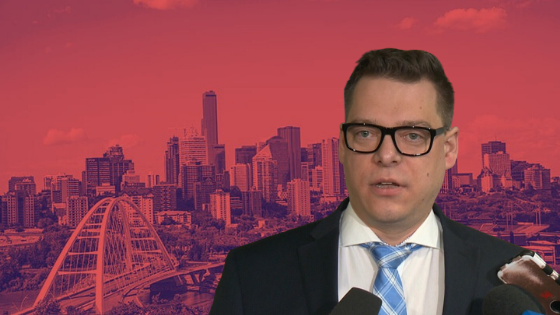Written By Guest User, Posted on May 23, 2020

As of April 2020, Alberta’s unemployment rate skyrocketed to 13.4 per cent, according to Statistics Canada. Full-time and part-time employment is down 182,500 and 61,300 positions, respectively, with 93,800 additional Albertans without work since March.
Recent data indicates that 304,300 Albertans are unemployed, as of May 8th.
Primarily attributed to COVID-19, small businesses, which account for the majority of job creation, have felt the financial pinch, according to the Edmonton Chamber of Commerce.
Per the Impact Survey Results from late April, about 33.6 per cent of Edmonton businesses can withstand the lockdown measures in place for one month at most. Only 28.8 per cent can face said measures for a month after that.
Jon Dziadyk, Edmonton’s City Councillor to Ward 3, opposes the renewal of Edmonton’s State of Local Emergency, citing “our bureaucracy is ruling in a way that is unprecedented.”
On April 22nd, Dziadyk penned a letter to Council to resume regular operations in response to COVID-19. “Rather than having un-elected people do so on our behalf, we need to prioritize who is in charge of ruling on what,” says Dziadyk, who also recognized that “there are a lot of smaller decisions that should be made by managers within the organization.”
Though his views on the initial Local State of Emergency have since changed, his stance on its renewal remains unwavering.
Per correspondence with the Office of Municipal Affairs, Timothy Gerwing, Minister Madu’s Press Secretary, acknowledged that amendments to the Emergency Management Act “allowed local and provincial States of Emergency to coexist.”
“While it is critical that municipalities coordinate and align their response efforts with the Government of Alberta’s approach and direction,” says Gerwing, “these changes ensure that local authorities can use their unique knowledge to keep Albertans safe and secure, during this pandemic.”
On May 14th, Stage 1 of the Province’s relaunch strategy commenced, allowing retail businesses, museums, hairstyling and barbershops to reopen, as well as 50 per cent capacity for cafes, restaurants, pubs and bars, amongst others.
On May 13th, Dziadyk was the only Edmonton Councillor to dissent from the vote, which he has done so for the past month. “None of my colleagues questioned the blanket State of Local Emergency.”
He states, “If we were not in a State of Local Emergency, and if the mayor or a fellow councillor wanted extra powers to respond to a crisis, a meeting by City Council could be convened pretty quickly, and we could grant those powers for as long as needed.”
Though not privy to all the conversations had, either due to their technical nature between bureaucracies or those had between the mayor and the province, Dziadyk has made his position clear.
“I am all about limited government and pushing accountability,” says Dziadyk, who is “excited to the economy rolling again, in accordance with the province’s relaunch strategy.”
The constituents of Ward 3 are heavily divided on the matter, from those who agree outright, those who are against in fear of a second wave, and those who are on the fence but hold concerns for the economic impacts of the pandemic.
80,000 Edmontonians total lost their jobs because of COVID-19, with small businesses feeling the brunt end of the costs.
As of late-April, 14.2 per cent of small businesses in Edmonton have deferred their property taxes, with 52.9 per cent fearing the prospects of permanent closure.
That is down from 58.2 per cent in mid-April.
Staff absences by self-isolation and child care purposes have also declined, despite layoffs and recommendations to work from home persisting.
The Local State of Emergency was renewed by City Council, yesterday, for an additional week.
Very well presented. Every quote was awesome and thanks for sharing the content. Keep sharing and keep motivating others.